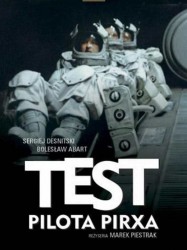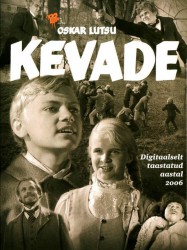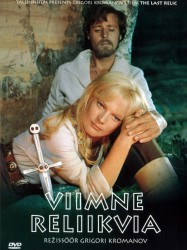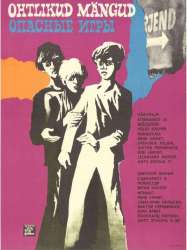Tallinnfilm

- Infos
- Meilleurs films
Si vous aimez cette entreprise, faites-le savoir !
Date de fondation 1 janvier 1931
Tallinnfilm is the oldest still functional film studio in Estonia. Originally founded as Estonian Culture Film in 1931, the studio was nationalized in 1940 after Estonia was forced into Soviet Union. During the first year of Soviet Occupation (1940–1941) Eesti Kultuurfilm was taken over by the Communist Party and renamed Kinokroonika Eesti Stuudio (the Estonian Newsreel Studio). In 1942 during the German occupation in World War II was renamed Kinokroonika Tallinna Stuudio (The Tallinn Newsreel Studio) and called Tallinna Kinostuudio (The Tallinn Film Studio) in 1947 again by the Soviets. The Tallinn Film Studio was renamed Kunstiliste ja Kroonikafilmide Tallinna Kinostuudio (Tallinn Feature and Newsreel Film Studio) in 1954 and in 1963 was renamed again Tallinnfilm
During the Soviet era, the studio was the only major movie production house in Estonia, leading to its being responsible for almost all feature-length movies of the time. (Most of the rest were produced by Eesti Televisioon.)
Most notable feature films produced by Tallinnfilm during the Soviet era were Viimne reliikvia (The Last Relic), released in 1969 by Tallinnfilm. The movie set the absolute box office record for the entire Soviet Union at the time by selling 44,9 million tickets. It was successfully distributed by the Soviet film export internationally in more than 60 countries. The Spring (1969) Estonian: Kevade directed by Arvo Kruusement sold 558,000 tickets in Estonia (Total population 1.34 million) and in 1971 8,100,000 in Soviet Union.
After Estonia regained independence in 1991, Tallinnfilm terminated its production activities and concentrated on the restoration of its film stock and film distribution. Since 2004 Tallinnfilm acts as art-house cinema operator. The owner of Tallinnfilm is Estonian Film Foundation.
Filmographie de Tallinnfilm (8 films)
Production

Le Procès du Piote Pirx (1979)
, 1h44Réalisé par Marek Piestrak
Genres Drame, Science-fiction
Thèmes L'espace, Dans l'espace, Space opera, Mise en scène d'un robot
Acteurs Alexandre Kaïdanovski, Vladimir Ivashov
Le film parle de "non linéaires finis", des robots qui ressemblent beaucoup aux êtres humains mais qui sont encore plus parfaits que les humains. Ils sont destinés à remplacer à terme les êtres humains dans les vols spatiaux. Quelque peu inquiètes quant à leur utilité, les Nations Unies mettent en place un vol spatial pour déterminer leurs réactions face aux êtres humains qui composent également l'équipage.
 , 1h20
, 1h20Réalisé par Grigori Kromanov
Origine Estonie
Genres Drame, Science-fiction, Thriller, Horreur, Policier
Thèmes Adaptation d'une œuvre littéraire de science-fiction
Acteurs Jüri Järvet, Uldis Pūcītis, Mikk Mikiver, Kārlis Sebris
L’Inspecteur Glebsky est appelé en plein hiver dans un hôtel des Alpes, où des phénomènes étranges ne tardent pas à se manifester. L’hôtel se retrouve coupé du reste du monde par une avalanche et un huis-clos angoissant s’instaure, ponctué par des événements surnaturels…

Printemps (1971)
, 1h24Réalisé par Arvo Kruusement
Origine Russie
Genres Drame, Comédie
Thèmes L'adolescence, L'enfance
Acteurs Margus Lepa, Leonhard Merzin, Ita Ever

La Dernière Relique (1971)
, 1h20Réalisé par Grigori Kromanov
Origine Estonie
Genres Action, Aventure, Historique, Romance
Acteurs Priit Pärn, Ingrīda Andriņa, Rolan Bykov, Elza Radziņa, Peeter Jakobi, Jüri Järvet
La Dernière Relique (Viimne reliikvia) est un film estonien de l'ère soviétique réalisé par Grigori Kromanov et sorti en 1969. Le film est adapté du roman Vürst Gabriel ehk Pirita kloostri viimsed päevad d'Eduard Bornhöhe (1893). Il est produit par les studios Tallinnfilm.
Distribution

Ohtlikud mängud (1974)
, 1h30Genres Drame, Guerre, Aventure
Thèmes Politique
Acteurs Jüri Järvet, Leonhard Merzin

Printemps (1971)
, 1h24Réalisé par Arvo Kruusement
Origine Russie
Genres Drame, Comédie
Thèmes L'adolescence, L'enfance
Acteurs Margus Lepa, Leonhard Merzin, Ita Ever

La Dernière Relique (1971)
, 1h20Réalisé par Grigori Kromanov
Origine Estonie
Genres Action, Aventure, Historique, Romance
Acteurs Priit Pärn, Ingrīda Andriņa, Rolan Bykov, Elza Radziņa, Peeter Jakobi, Jüri Järvet
La Dernière Relique (Viimne reliikvia) est un film estonien de l'ère soviétique réalisé par Grigori Kromanov et sorti en 1969. Le film est adapté du roman Vürst Gabriel ehk Pirita kloostri viimsed päevad d'Eduard Bornhöhe (1893). Il est produit par les studios Tallinnfilm.
 Connexion
Connexion
